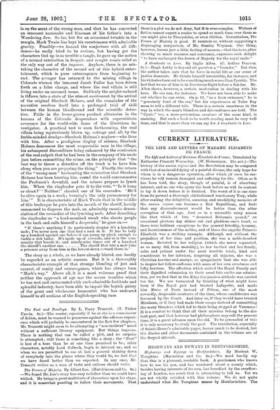CURRENT LITERAT URE.
THE LIFE AND LETTERS OF MADAME ELISABETH DE FRANCE.
The Life and Letters of Madame Elisabeth de France. Translated by Katharine Prescott Wormeley. (W. Heinemann. 21s. not.)—The history of the ancien regime and the Revolution may be compared with that of an invalid dying of a painful disease, the only hope for whom is in a dangerous operation, after which (if even he sur- vives) he will remain damaged and suffering for life. Often as it has been told, the story, though of painful, is of absorbing interest, and no one who opens the book before us will be content to lay it down before it is finished. The worst of it is one rises from its perusal a thorough old-fashioned reactionary Tory, while after reading the delightful, amusing, and unedifying memoirs of the ancien regime one becomes a Red Republican, and feels that any dismemberment would be better than the utter corruption of that age. Just as in a miserable rainy season like that which of late " drenched Britannia passed," an occasional glorious day shines out and gladdens ono's heart, so there were brilliant exceptions to the general frivolity, tyranny, and licentiousness of the nobles, and of these the angelic Princess Elisabeth was a striking example. Although not without the prejudices of her time and position, she was a noble-hearted woman. Devoted to her religion (which she never separated, as so many did, from morality), to her brother and her family, calm and patient under the most terrible trials, kind and considerate to her inferiors, forgiving all injuries, she was a Christian heroine and martyr, so sympathetic that she was able to inspire her fellow-sufferers with some of her own sweetness and lofty heroism. The affection which united the Royal Family and their dignified submission to their oruel fate excite our admira- tion, yet we feel that in the King this passive attitude was carried too far. We are tormented by thinking of what might have been if the Royal pair had trusted Lafayette, and made him Haire of Paris instead of Potion, one of the' most cowardly, despicable creatures of the time, whose candidature was favoured by tho Court. And later on, if they would have trusted Mirabeau, or if they had made their escape instead of committing the many blunders which led to their being stopped at Varennes ! It is a comfort to think that all their miseries belong to the dis- tant past, and that however bad philosophers may call the present time, it is a great advance upon the old. To be persuaded of this it is only necessary to study the past. The translation, especially of Sainte-Beuve's admirable pages, leaves much to be desired, but the diaries and other documents contained in the volume are of the deepest interest.


















































 Previous page
Previous page